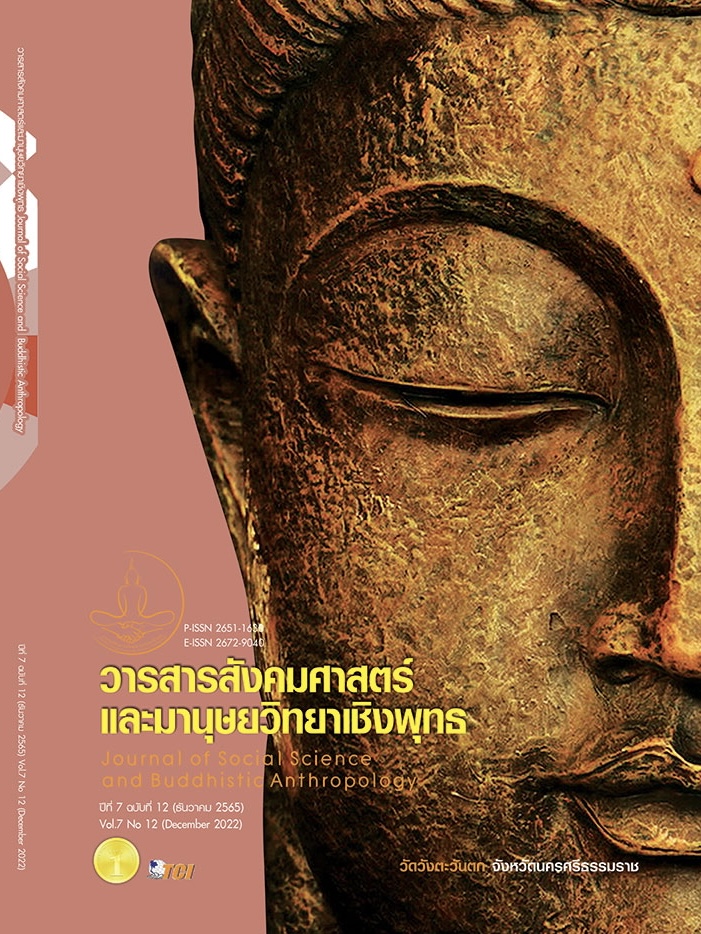DEVELOPMENT OF CLASSROOM ASSESSMENT COMPETENCY FRAMEWORK OF TEACHERS IN BASIC EDUCATION LEVEL
Keywords:
Teacher’s Competency, Classroom Assessment, Teachers in The Basic Education LevelAbstract
This research paper aims to 1) develop a classroom assessment competency framework of teachers in the basic education level, and 2) develop classroom assessment competency descriptions of teachers in the basic education level. This study is descriptive research. Seven experts in the field of educational measurement and evaluation who are associate professor or higher were selected to collect the data. Research instrument was a 5 levels rating-scaled assessment form. The data were analyzed by using median and IQR and the criteria that was used to judge framework descriptions contained median over 3.50 and IQR below 1.50 means accurate and suitable quality. This research was developed a classroom assessment competency framework by synthesis 34 research articles and evaluated from experts. Findings revealed as follows: 1) According to the classroom assessment competency framework of teachers in the basic education level, the assessment results contained a median between 3.00 to 4.00 and IQR between .50 to 1.00, thus implying the accurate and suitable quality of the competency framework with five core competencies and 11 elements of competence and 2) As for the classroom assessment competency descriptions of teachers in the basic education level, the assessment result contained a median between 4.00-5.00 and IQR of 1.00, hence implying the accurate and suitable competency descriptions.
References
ประกาศคณะกรรมการคุรุสภา. (2563). เรื่อง รายละเอียดของมาตรฐานความรู้และประสบการณ์วิชาชีพครู. ราชกิจจานุเบกษา เล่ม 137 ตอนพิเศษ 109ง หน้า 10 (7 พฤษภาคม 2563).
ประกาศสำนักงานคณะกรรมการการศึกษาขั้นพื้นฐาน. (2562). เรื่อง แนวทางการวัดประเมินผลผู้เรียนระดับการศึกษาขั้นพื้นฐาน. ราชกิจจานุเบกษา เล่ม 133 ตอนพิเศษ 200ง หน้า 1 (8 กันยายน 2560).
ประกาศสำนักงานคณะกรรมการข้าราชการครูและบุคลากรทางการศึกษา. (2564). เรื่อง มาตรฐานตำแหน่งข้าราชการครูและบุคลากรทางการศึกษา. ราชชกิจจานุเบกษา เล่ม 138 ตอนพิเศษ 312ง หน้า 1 (21 ธันวาคม 2564).
ศิริชัย กาญจนวาสี. (2549). การวัดและประเมินสมรรถนะบุคลากรวิชาชีพ. วารสารการวิจัยทางสังคมศาสตร์, 12(1), 24-34.
สถาบันทดสอบทางการศึกษาแห่งชาติ. (2561). รายงานประจำปี 2560. ใน รายงานการวิจัย. สถาบันทดสอบทางการศึกษาแห่งชาติ.
สถาบันทดสอบทางการศึกษาแห่งชาติ. (2562 (ก)). รายงานการวิจัย. ใน การทดสอบสมรรถนะการวัดประเมินผล. สถาบันทดสอบทางการศึกษาแห่งชาติ.
สถาบันทดสอบทางการศึกษาแห่งชาติ. (2562(ข)). รายงานประจำปี 2561. ใน รายงานการวิจัย. สถาบันทดสอบทางการศึกษาแห่งชาติ.
Assessment reform group. (2008). Changing Assessment Practice. Paris: Assessment Reform Group.
Australian curriculum, assessment and certification authorities. (1995). Australian Curriculum Assessment and reporting authority. Sydney: ACACA.
Betts, M. & Smith, R. (2005). Developing the credit-based modular curriculum in higher education: challenge, choice and change. london: Routledge.
Birko, S. et al. (2015). Evaluation of Nine Consensus Indices in Delphi Foresight Research and Their Dependency on Delphi Survey Characteristics:A Simulation Study and Debate on Delphi Design and Interpretation. PLOS ONE, 10(8), 167-199.
Brown, G. T. (2019). Frontiers in Education: Is assessment for learning really assessment. Retrieved November 1, 2022, from https://www.frontiersin.org/articles/10.3389/feduc.2019.00064/full
Bunce, L. et al. (2018). The student-as-consumer approach in highereducation and its effects on academic performance. Studies in Higher Education, 42(11), 1958-1978.
DeLuca, C. & Klinger, D. A. (2016). Assessment literacy development : identifying gaps in teacher candidates’ learning. Assessment in Education Principles Policy& Practice, 17(4), 419-438.
DeLuca, C. et al. (2018). Teachers’ approaches to classroom assessment: A large-scale survey. Assessment in Education: Principles, Policy & Practice, 25(4), 355-375.
Department for education. (2013). National curriculum assessments. London: Department for education UK.
Heritage, M., & Kingston, N. M. (2019). Classroom Assessment and Large‐Scale Psychometrics: Shall the Twain Meet?(A Conversation With Margaret Heritage and Neal Kingston). Journal of Educational Measurement, 56(4), 670-685.
Joint Committee on Standards for Educational Evaluation. (2015). The Classroom Assessment Standards for PreK-12 Teachers. USA: Kindle Direct Press.
Koloi-Keaikitse, S. (2016). Assessment training: A precondition for teachers’ competencies and use of classroom assessment practices. International Journal of Training and Development, 20(2), 107-123.
Mellati, M. & Khademi, M. (2018). Exploring teachers' assessment literacy: Impact on learners' writing achievements and implications for teacher development. Australian Journal of Teacher Education (Online), 43(6), 1-18.
Michigan assessment consortium. (2017). Assessment Literacy Standards. Michigan: Michigan Assessment Consortium.
Naibaho, L. (2021). Online Learning Evaluation during Covid-19 using CSE-UCLA Evaluation Model at English Education Department Universitas Kristen Indonesia. Budapest International Research and Critics Institute (BIRCI-Journal): Humanities and Social Sciences, 4(2), 1987-1997.
OECD. (2005). Teacher Evaluation : A Conceptual Framework and examples of Country Practices. Paris : OECD.
Persai, D. et al. (2016). A Delphi study for setting up tobacco research and practice network in India. Tobacco induced diseases, 14(4), 78-97.
Plake, B. S., & Wise, L. L. (2014). What is the role and importance of the revised AERA, APA, NCME Standards for Educational and Psychological Testing? Educational Measurement: Issues and Practice, 33(4), 4-12.
Popham, W. J. (2013). Classroom Assessment : What Teachers Need to Know. (8th ed.). USA: Pearson Publishing.
Price, M. et al. (2011). Feedback: Focusing attention on engagement. Studies in higher education, 36(8), 879-896.
Sedelmaier, Y., & Landes, D. (2012). A research agenda for identifying and developing required competencies in software engineering. International joournal of Engineerring pedagogy, 3(2), 30-35.
The European standards and guidelines for quality assurance. (2015). Standards and Guidelines for Quality Assurance in the European Higher Education Area. Belgium: EURASH.
Worthington, A. C. (2022). The impact of student perceptions and characteristics on teaching evaluations: a case study in finance education. Assessment & Evaluation in Higher Education, 27(1), 49-64.
Yılmazer, M. Ö. & Özkan, Y. . (2017). Classroom assessment practices of English language instructors. Journal of Language and Linguistic Studies, 13(2), 324-345.
Downloads
Published
How to Cite
Issue
Section
License

This work is licensed under a Creative Commons Attribution-NonCommercial-NoDerivatives 4.0 International License.









